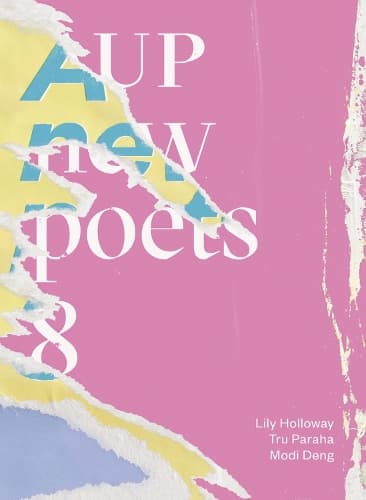Review: AUP New Poets 8
Reviewed by Paula Green
Editor Anna Jackson has selected three distinctive poets for AUP New Poets 8 and has placed them in the perfect tonal order.
The title of Lily Holloway’s suite, a child in the alcove, reminds me of poetry’s alcove-like features. Poems can be miniature shelters, places of refuge, an interplay of dark and light, secret, mysterious, challenging, bulging with nooks and crannies. Reading the work is to read across myriad directions, to peer into captivating cubbyholes and, as Jackson writes in her terrific foreword, to read distance and depth.
Holloway is an award-winning writer and postgraduate student who has been published in numerous journals. I have long admired her poetry: her aural and linguistic deftness, the sweet measure of surprise, the variegated forms, the connecting undercurrents, the honey, the bitterness. Her poems run on the rewarding premise that poems don’t need the full explanation, that tactile detail and deft juxtapositions can unmask love, desire, razor edges, self-exposure. Pocket narratives are equally sublime.
Holloway’s poetry is both acutely and satisfyingly personal: with mother and father appearances, lovers, a younger self. The child, for example, is an ongoing link between past and present: “It happens / and a child / runs backwards / rewinding / into my chest.” So many poems hook and replenish me, especially the mother in a surreal dream sequence, especially the father trying to make sense of the speaker’s depression.
my dad talks about my depression
as if it were a tide
he says, ‘well you know,
the water is bound to go in and out’
and to ‘hunker down’
he’s trying to make sense of it
in a way he understands
so he can show me his working
i look out to that expanse,
bare now to the beaks of grey herons,
which i realise is me
in this metaphor
(from as the tide)
Tru Paraha is a choreographer and director in her final year of a postdoctoral research fellowship at the University of Auckland. Her work brings together artists’ pages, live performances and poetry inspired by deep space, by te pō.
Her poem sequence, in my darkling universe, resembles a form of choreography, perhaps painting. The syntax twitches, the lexicon stretches and contracts, te reo and English touch upon the line, words break apart, the gaps on the page bulge with stillness and movement. Letters float like miniature constellations. Silence is a framing device, yet the space on the page is rich. Political, personal, eye-catching. The words drift and dance, resist conventional poetic forms.
Reading this glorious sequence is like entering an unfathomable, body-tumbling, awe-inspiring space in which a fascinating overlay of spiderweb connections anchor you. Poems reach from here to there, from home to not-home, from the miniature to the large.
thigh bone pavilion
en
tangle tan angel
staccato g-s pots
dreamtime broth …
e ipo (i te pō ask sky
alien awaken her)e ?
torn light
Modi Deng is a London-based pianist where she is continuing her postgraduate performance studies at the Royal Academy of Music. Her ensemble, the Korimako Trio, has performed on UK tours and BBC Radio 3 and RNZ Concert. Deng’sMedi’s poetry slows down to inhabit the moment: a little story, an epiphany, an intimacy, a confession.
With exquisite lyricism, both spare and melodic, she moves from Brahms, McCahon and Monet to morning, to running in the present tense. Tactile phrases are textures on the line: “biscuity dark,” “globby grey on the right.” The opening list poem, lessons, is one I will pin to my wall: “being passive means being a cavity for someone to fill.” In the haunting poem, a conversation, the lines are ruptured by a jagged wide band that stands in for a mother daughter distance and divide. Two words that resound as I read this terrific debut are quietude and joy.
but before then I will
mix myself like so
smaller than a
leaf spine / smaller than space between
floorboards / smaller than sand
in black dripping
down into the linen of every day. and wait for a beam
to send me, onwards.
from tomorrow will be the same but not as this
The AUP New Poets series, under Anna Jackson’s astute editorship, has confirmed its place as essential poetry reading.
Reviewed by Paula Green
